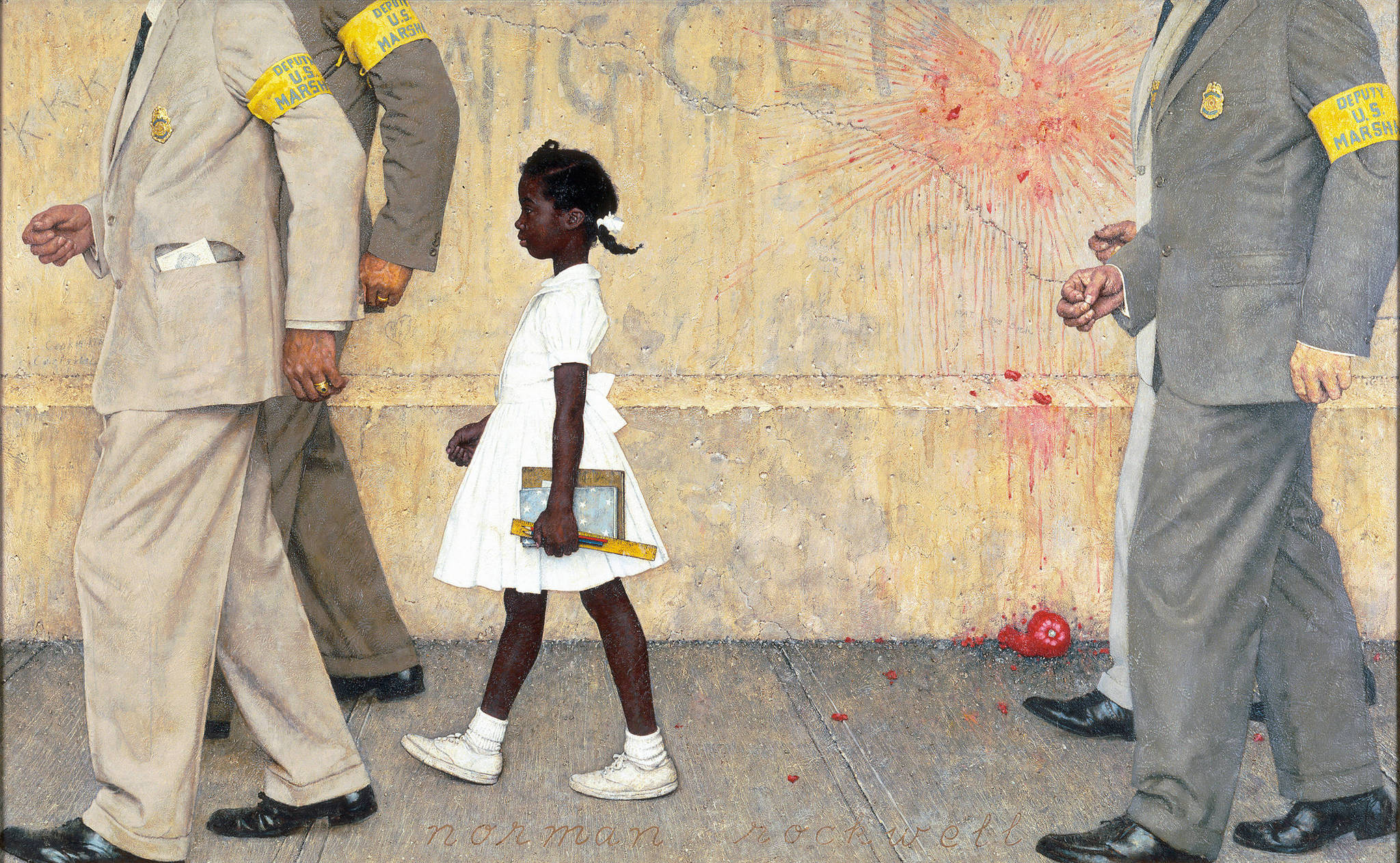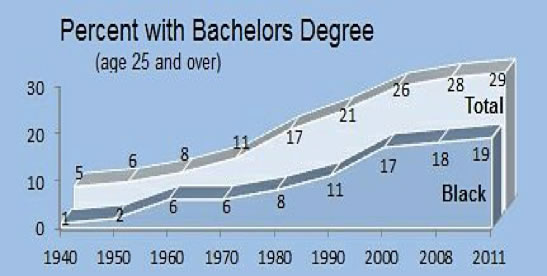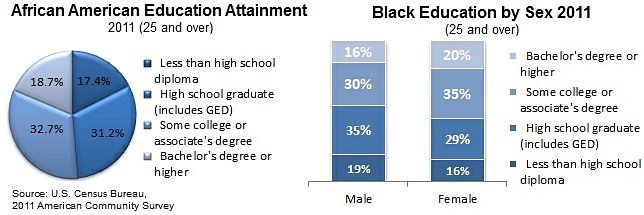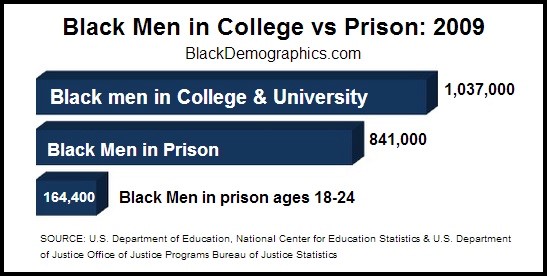Feb
Educational Amnesia

EDUCATIONAL AMNESIA by Bryan A. Brown, Ph.D.
I feel like something went wrong! There was a time in the life of black families when people thought, “If I can only get my child a quality education, their life will be changed forever.” Black folks would fight and protest for high quality education. I feel like somewhere we went wrong. When it comes to education, African-Americans have suffered from a case of amnesia.
 This thought came to me as I reflected on two images. First, there was Ruby Bridges. She was just a little girl, who had a family that thought so much of her that her that they fought to ensure she had the best possible education. The result was a child who had to be escorted to school by US Marshalls to obtain what was her constitutional right. She had the right to an education and her family made sure she was afforded that right. They were true revolutionaries!
This thought came to me as I reflected on two images. First, there was Ruby Bridges. She was just a little girl, who had a family that thought so much of her that her that they fought to ensure she had the best possible education. The result was a child who had to be escorted to school by US Marshalls to obtain what was her constitutional right. She had the right to an education and her family made sure she was afforded that right. They were true revolutionaries!
The thought of that is just too complicated for me. What I saw in the picture, was a beautiful black girl. A young girl, who with brief case in hand, learned two vital things. First, she learned the basics of elementary school. She learned to read, write, and do math. Second, she learned that education was something worth fighting for. It was something that deserved her best effort and could change her life. I wonder do we continue to send that message to our children.
Another image sparked my thoughts about the educational amnesia that has seeped into the black community. This image is not so different than the first. It is an image of James Meredith heading to school at the University of Mississippi. Ole Miss did not want Meredith, but he had something to prove. I cannot image how difficult it was for Meredith to earn that degree. Can you imagine how biased the teacher’s evaluations of his work must have been? Can you image how hostile other students were to him? Somehow, despite that opposition, he thrived and graduated. He was a true revolutionary!
For him, college was not about step shows, Greek life, or parties. For Meredith earning the best education possible was act of liberation. It broke down doors and enabled him to earn access to what should have been his birth right as a US citizen. He fought to make a better life possible for him and all that came after. I wonder what happened to this passionate pursuit of educational excellence? For years, black folks fought for a chance to earn the best educational opportunities possible, yet today the passion for educational access and belief in the educational system is found in subgroups of the African-American community, but is not our collective norm.
So what do I mean by subgroups? Take for example Nigerian-Americans. Despite the fact that many would not consider themselves “African-Americans”(I won’t get into that), a 2012 report identified them at the most educated ethnic group in the US Their collective emphasis on education has produced generations of high achieving students who focus on educational success. According to the 2006 census, 37 percent of Nigerians in the U.S. held bachelor’s degrees, 17 percent held master’s degrees and 4% earned doctorates. For the sake of contrast only 19% of White Americans earned bachelor’s degrees, 8% held master’s degrees, and 1% earned doctorates in the same year. So what is the difference?
In some ways, they remembered to operate by the rules of the Black Tax. For years, black communities offered a simple message. You are going to have to be twice as good to be seen as equal because of racial bias. Their community focus on education produces the kind of pressure that nurtures success in their children. When interviewed about the success of the Nigerian community, Baylor College professor Oluyinka Olutoye explained, “Being Black, you are already at a disadvantage, you really need to excel far above if you want to be considered for anything in this country.” In many ways, this is a direct explanation of how the black tax worked. It is what James Meredith had to know in order to excel and is what many African-American families emphasize today.
Our Current Situation
Although the reports of our contemporary educational performance report a tale of complete failure, the truth is far more complicated. The truth is our children are more educated than we have ever been. A simple conversation with your grandmother about her educational experiences and opportunities will reveal that in 2015 African-American children are being asked to do more than ever before and are learning far more than what is being reported.
When we consider African-American’s who are older than 25 years of age we see a positive trend in educational obtainment. 1.6 million African-American have earned advanced degrees. These MA, Ph.D., J.D., and M.D. recipients reflect a huge improvement from 1995 when on 677,000 African-Americans earned those same degrees.
In 2011 18.7 percent of all African-American students held a bachelors degrees 80% of African-Americans over age 25 have high school diplomas (see footnote 1). More importantly since the year 2000 the percentage of African-Americans earning college degrees increased to 19%. Although the national average is 29%, it does not reflect the fact that African-Americans are going to college and graduating at higher rates than ever before.
Additionally, despite the myth of African-American men going to prison at higher rates than they are going to college, the data says differently. The US department of education reports that in 2009 1,037,000 African American men were enrolled in college compared to 841,000. The irony is that the comparison that is often made is between men ages 18-25 (college age) and men of all ages in prison (18-70). When comparing by age, 1,037,000 school aged African-American men are in college, while 164,000 are in prison. So, truth be told, the rumors of the demise of the African-American male are greatly exaggerated (see footnote 2).
No Lack of Mentors/ A Lack of Memory
So what seems to be the problem? The usual suspects always arise. Systemic oppression, racism, and wealth disparities have all conspired to lock African-Americans out of the educational system. I would like us to consider another conspirator. In some ways our educational amnesia has caused some of us to lose our commitment and focus on education.
There are many African-American families who push their children to achieve in school. These families fight with their children every night to do homework and will not tolerate anything less than A’s for their sons and daughters. However, many have written education off as the property of the white community. They no longer buy the premise that earning good grades will produce greater access to success in life. This lack of memory completely erases the historical success of people like Thurgood Marshall, Mae Jamison, Adam Clayton Powell, Shirley Chisom, Barak Obama, Cornell West, Corey Booker, Barbara Lee, and many others whose common bind is their educational success. Do we no longer believe that earning degrees with change our lives?
Our collective action would say that we have developed a case of educational amnesia and no longer remember the impact of higher education. This thought was never made so clear to me as it was when I had a conversation with my colleague about mentoring. He said, that black folks do not have a mentoring problem. When you look at AAU Basketball programs and Pop Warner football programs across the nation, Black male role models and mentors are everywhere. By contrast when looking at after school tutorial programs, science programs, and math programs Black male mentors are nowhere to be found. In this way, it is not a matter of mentoring, but rather a matter of focus.
How could we allow our focus to be shifted away from education and towards sports and entertainment? The logic of this shift is reasonable. Our children and families are bombarded with images of the financial success of athletes and entertainers. However, media does not show us how Doctors, Lawyers, Engineers, and business people live lives of success made possible by education. Additionally, these educated lives may not be as sexy as sports and entertainment because these lives of success may only appear to be slightly better.
When I see Dre and Rainbow from the TV show “Blackish” in their beautiful home, I am remind of the simplicity of success. Simple things come to mind like paying your car repair in cash instead of having to put it on a credit care; that is success. Things like having a savings account to cover the cost of 6 months of unemployment, or having the finances to send your children to private school, or being able to shop and go out to dinner with little focus on the effect on one’s budget are all subtle signs of success. These small differences in lifestyle have an incredible generational impact, but no longer seem to be the focus on the African-American community.
We once fought for schools that were equal. When those schools were separate, we fought for integrated education. When we could not trust predominantly white organizations to educate our children, we went to and respected Historically Black Colleges and Universities. Did we forget our educational legacy? Do we no longer respect the W.E.B Dubois, Booker T. Washington, and Freeman Hrabowski’s types who championed educational obtainment? Perhaps some black folks suffer from a case of educational amnesia? I truly hope we remember who we really are.
——————————————————————-
-
Data from: http://www.bet.com/news/national/2012/03/20/survey-nigerians-most-educated-in-the-u-s.html.
-
Data From: All statistics reported are courtesy of www.blackdemographics.com.
Categories
- Algebra (5)
- Apps (52)
- Articles (11)
- Asian History (4)
- Asian History Heritage (13)
- Asian History Heritage Articles (8)
- Asian History Heritage Prayer (1)
- Asian History Heritage Spotlight (9)
- Band (3)
- Biology (11)
- Black History Heritage (39)
- Black History Heritage Articles (17)
- Black History Heritage Links (6)
- Black History Heritage Prayers (12)
- Black History Heritage Spotlight (16)
- Calculus (5)
- Career Counseling (1)
- Chemistry (10)
- Chorus (3)
- Computer Science (3)
- Dance (2)
- Economics (11)
- English (11)
- English Studies (3)
- Environmental Science (12)
- Ethics & Values (13)
- Faith & Culture (12)
- Faith & Culture Articles (7)
- Faith & Culture Prayers (4)
- Faith & Culture Spotlight (4)
- Faith & Religion (9)
- FAQ (3)
- FAQ Gradebook (3)
- French (4)
- Gay, Lesbian, and Transgender (17)
- Gay, Lesbian, and Transgender – Articles (7)
- Gay, Lesbian, and Transgender – Prayers (3)
- Gay, Lesbian, and Transgender – Spotlight (10)
- Geography/Epistemology (6)
- Geometry (4)
- Health (6)
- Inclusive Curriculum at Saint Mary’s (1)
- International Languages (13)
- Irish History & European Cultures (18)
- Irish History & European Cultures – Articles (7)
- Irish History & European Cultures – Prayers (6)
- Irish History & European Cultures – Spotlight (7)
- Islamic History (4)
- Latino & Hispanic History & Heritage (25)
- Latino & Hispanic History & Heritage Articles (13)
- Latino & Hispanic History & Heritage Prayers (5)
- Latino & Hispanic History & Heritage Spotlight (17)
- Learning Management (26)
- Lectures (2)
- Literature (3)
- Marine Biology (9)
- Mathematics (15)
- Multimedia (5)
- Physical Education (2)
- Physical Education & Health (16)
- Physics (10)
- Physiology (8)
- Poetry (3)
- Psychology (10)
- Public Policy (12)
- Register to Vote! (10)
- Register to Vote! – Articles (5)
- Register to Vote! – Links (3)
- Register to Vote! – Prayers (1)
- Register to Vote! – Spotlight (2)
- Religious Studies (21)
- Science (23)
- Scripture (9)
- Senior Project (1)
- Social Justice (13)
- Social Studies (25)
- Spanish (4)
- Sports Medicine (4)
- Statistics (5)
- Student Committee (3)
- Student Committee – 2015-2016 (2)
- Technology Use Guides (8)
- Theater Arts (6)
- Trigonometry (4)
- Uncategorized (6)
- US Government (9)
- US History (10)
- Videos (6)
- Visual & Performing Arts (15)
- Visual Arts (6)
- Women History – Articles (3)
- Women History – Prayers (2)
- Women History – Spotlight (3)
- Womens History (8)
- World History (8)
- World Religions (9)
Post Calendar
| M | T | W | T | F | S | S |
|---|---|---|---|---|---|---|
| 1 | 2 | 3 | 4 | 5 | 6 | |
| 7 | 8 | 9 | 10 | 11 | 12 | 13 |
| 14 | 15 | 16 | 17 | 18 | 19 | 20 |
| 21 | 22 | 23 | 24 | 25 | 26 | 27 |
| 28 | 29 | 30 | ||||
Categories
Archives
- March 2020 (3)
- October 2017 (3)
- September 2017 (3)
- August 2017 (2)
- April 2017 (3)
- February 2017 (13)
- September 2016 (1)
- August 2016 (1)
- May 2016 (28)
- April 2016 (9)
- March 2016 (3)
- February 2016 (94)
- January 2015 (8)
- December 2014 (12)
- September 2014 (1)
- November 2013 (1)
- October 2013 (1)
- May 2013 (2)
- April 2013 (23)
- March 2013 (14)
- February 2013 (13)
- October 2012 (1)
- September 2012 (2)
- January 2012 (1)
Recent Posts
- Distance Learning Resources March 18, 2020
- Visualizing the History of Pandemics March 15, 2020
- Visualizing the History of the World March 15, 2020
- America Georgine Ferrera October 4, 2017
- Sophie Cruz October 3, 2017




